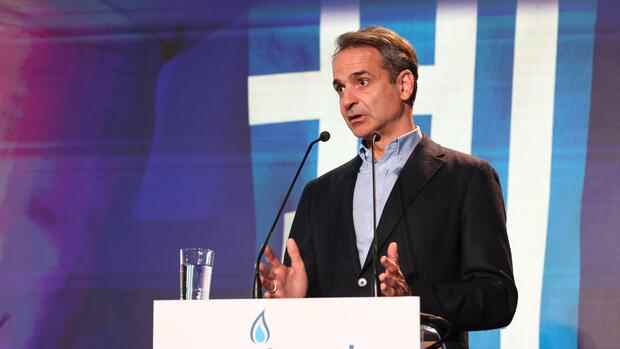According to the plans of the prime minister and neighboring countries, Greece wants to become the hub for the energy supply of south-eastern Europe.
(Photo: ROPI)
Athens Russia’s war against Ukraine has brought the states of south-eastern Europe closer together on energy policy. The heads of state and government of Greece, Bulgaria, North Macedonia and Serbia as well as the President of the European Council, Charles Michel, gave the starting signal for the construction of a terminal for liquefied natural gas (LNG) in the northern Greek port city of Alexandroupoli on Tuesday.
The plant is intended to supply the Balkan region with natural gas. The countries want to free themselves from their dependency on the Russian state-owned company Gazprom.
Greek Prime Minister Kyriakos Mitsotakis spoke of a “lighthouse project”: It shows the determination of the countries in the region to work together on energy supply. “Moscow’s recent blackmail makes this cooperation necessary and urgent,” he said.
“We will soon be able to replace Russian gas,” Mitsotakis announced. EU Council President Michel also underlined the importance of the project for the diversification and security of Europe’s energy supply.
Top jobs of the day
Find the best jobs now and
be notified by email.
The terminal is built and operated by the company Gastrade. A floating storage and regasification facility (FSRU) is to be anchored 18 kilometers southwest of the port city. The shipowner Peter Livanos, who is involved in Gastrade, is currently having one of his gas tankers converted at a shipyard in Singapore.
The other shareholders in Gastrade are the Greek Copelouzos Group, the Greek gas supplier Depa, the network operator Desfa and the Bulgarian state gas group Bulgartransgaz. The North Macedonian pipeline operator NER is also negotiating an entry into Gastrade.
The EU is funding the project with 166.7 million euros
Initial plans for the terminal date back to 2009. In view of the Ukraine war, implementation is now being accelerated. The plant is scheduled to go into operation before the end of 2023.
The EU is funding the project, which is estimated at 394 million euros, with 166.7 million euros. The floating terminal will be connected to the mainland via an underwater pipeline, where the gas will be fed into the Greek grid and from there distributed to neighboring countries.
The most important link is a 180-kilometer pipeline between the northern Greek city of Komotini and Stara Zagora in Bulgaria. The EUR 240 million line was financed by Greece, Bulgaria and the EU and is scheduled to go into operation in June. This will not only connect Bulgaria to the planned Alexandroupoli LNG terminal, but also to the so-called southern gas corridor, which brings natural gas from Azerbaijan to Italy via Georgia, Turkey and Greece.
In addition, Bulgaria and Serbia have been building a gas pipeline between the two countries since February with financial help from the EU and a loan from the European Investment Bank. It is scheduled to go into operation in October 2023. This would also connect Serbia to the terminal in Alexandroupoli. In addition, the governments in Athens and Skopje signed contracts last year to build a 123-kilometer pipeline through which gas will flow from the Greek network to North Macedonia.
More Handelsblatt articles on the subject of gas supply:
The capacity of FSRU Alexandroupoli will be 6.1 billion cubic meters per year in the first phase. Gastrade is already planning a second plant. Gastrade CEO Konstantinos Sifnaios said Tuesday the regulator gave its approval last week. This would make it possible to also supply Moldova and Ukraine with gas.
Together, both plants would have a capacity of 11.6 billion cubic meters per year, Sifnaios said. For comparison: Greece’s annual consumption is currently around six billion cubic meters, Bulgaria and Serbia each consume around 3.5 billion cubic meters.
Greece has been investing in its LNG infrastructure for some time and is now massively expanding it: The storage capacity of the Revithousa terminal near Athens, which has existed since 1999 and currently covers 43 percent of Greek gas imports, is being increased from 225,000 to 375,000 cubic meters. New terminals are also planned near Corinth, Thessaloniki and Volos.
More: Eon boss Birnbaum: “A gas embargo could tear Europe apart.”
